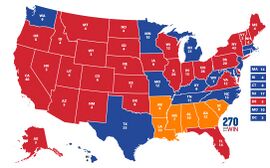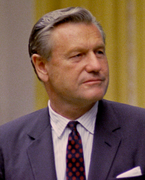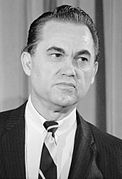1964 United States presidential election (TAOR): Difference between revisions
No edit summary |
No edit summary |
||
| (One intermediate revision by the same user not shown) | |||
| Line 5: | Line 5: | ||
| previous_election = {{wp|1960 United States presidential election}} | | previous_election = {{wp|1960 United States presidential election}} | ||
| previous_year = 1960 | | previous_year = 1960 | ||
| election_date = {{Start date| | | election_date = {{Start date|1964|11|03}} | ||
| next_election = {{wp|1972 United States presidential election}} | | next_election = {{wp|1972 United States presidential election}} | ||
| next_year = 1972 | | next_year = 1972 | ||
| Line 17: | Line 17: | ||
<!-- Nelson Rockefeller --> | <!-- Nelson Rockefeller --> | ||
| image1 = NelsonRockefeller.png | | image1 = NelsonRockefeller.png | ||
| nominee1 = [[Nelson Rockefeller ( | | nominee1 = [[Nelson Rockefeller (TAOR)|'''Nelson Rockefeller''']] | ||
| party1 = {{wp|Republican Party (US)|Republican}} | | party1 = {{wp|Republican Party (US)|Republican}} | ||
| home_state1 = {{wp|New York (state)|New York}} | | home_state1 = {{wp|New York (state)|New York}} | ||
| Line 57: | Line 57: | ||
| before_election = {{wp|Lyndon B. Johnson}} | | before_election = {{wp|Lyndon B. Johnson}} | ||
| before_party = {{wp|Democratic Party (US)|Democratic}} | | before_party = {{wp|Democratic Party (US)|Democratic}} | ||
| after_election = [[Nelson Rockefeller ( | | after_election = [[Nelson Rockefeller (TAOR)|Nelson Rockefeller]] | ||
| after_party = {{wp|Republican Party (US)|Republican}} | | after_party = {{wp|Republican Party (US)|Republican}} | ||
}} | }} | ||
The '''1964 United States presidential election''' was the 45th quadrennial presidential election. Held on Tuesday, November 3, 1964, incumbent {{wp|Democratic Party (US)|Democratic}} President {{wp|Lyndon B. Johnson}} was defeated by {{wp|Republican Party (US)|Republican}} nominee and {{wp|New York (state)|New York}} governor, [[Nelson Rockefeller ( | The '''1964 United States presidential election''' was the 45th quadrennial presidential election. Held on Tuesday, November 3, 1964, incumbent {{wp|Democratic Party (US)|Democratic}} President {{wp|Lyndon B. Johnson}} was defeated by {{wp|Republican Party (US)|Republican}} nominee and {{wp|New York (state)|New York}} governor, [[Nelson Rockefeller (TAOR)|Nelson Rockefeller]], who also defeated the {{wp|American Independent Party}} nominee and {{wp|Alabama}} governor, {{wp|George Wallace}}. | ||
{{wp|Lyndon B. Johnson|Johnson}} took office on November 22, 1963, following the assassination of his predecessor, {{wp|John F. Kennedy}}. He easily defeated a primary challenge by segregationist Governor {{wp|George Wallace}} of {{wp|Alabama}} (who later went on to run on a 3rd party ticket), to win the nomination to a full term. At the {{wp|1964 Democratic National Convention}}, {{wp|Lyndon B. Johnson|Johnson}} also won the nomination of his preferred running mate, Senator {{wp|Hubert Humphrey}} of {{wp|Minnesota}}. Meanwhile, at the {{wp|1964 Republican National Convention}}, an otherwise contentious primary election resulted in {{wp|New York (state)|New York}} governor, [[Nelson Rockefeller ( | {{wp|Lyndon B. Johnson|Johnson}} took office on November 22, 1963, following the assassination of his predecessor, {{wp|John F. Kennedy}}. He easily defeated a primary challenge by segregationist Governor {{wp|George Wallace}} of {{wp|Alabama}} (who later went on to run on a 3rd party ticket), to win the nomination to a full term. At the {{wp|1964 Democratic National Convention}}, {{wp|Lyndon B. Johnson|Johnson}} also won the nomination of his preferred running mate, Senator {{wp|Hubert Humphrey}} of {{wp|Minnesota}}. Meanwhile, at the {{wp|1964 Republican National Convention}}, an otherwise contentious primary election resulted in {{wp|New York (state)|New York}} governor, [[Nelson Rockefeller (TAOR)|Nelson Rockefeller]] winning the nomination over {{wp|Arizona}} Senator {{wp|Barry Goldwater}}, the leader of the conservative faction of the {{wp|Republican Party (US)|Republican Party}} and {{wp|Pennsylvania}} Governor, {{wp|William Scranton}}, who was subsequently nominated as [[Nelson Rockefeller (TAOR)|Rockefeller]]'s running mate. | ||
{{wp|Lyndon B. Johnson|Johnson}} championed his passage of the {{wp|Civil Rights Act}}, and advocated a series of anti-poverty programs collectively known as the {{wp|Great Society}}. In response, [[Nelson Rockefeller ( | {{wp|Lyndon B. Johnson|Johnson}} championed his passage of the {{wp|Civil Rights Act}}, and advocated a series of anti-poverty programs collectively known as the {{wp|Great Society}}. In response, [[Nelson Rockefeller (TAOR)|Rockefeller]], in an attempt to placate both the conservative and liberal factions of his party, advocated for a tougher response to the {{wp|Vietnam War}}, while also championing a variety of causes such as civil rights, social welfare, and conservation, which he had previously done so as {{wp|Governor of New York}}. Meanwhile, {{wp|Alabama}} governor, {{wp|George Wallace}}, formerly a {{wp|Democratic Party (US)|Democrat}}, ran on the {{wp|American Independent Party}} ticket, campaigning in favour of racial segregation. | ||
After opinion polls initially indicated a decisive {{wp|Lyndon B. Johnson|Johnson}} win, [[Nelson Rockefeller ( | After opinion polls initially indicated a decisive {{wp|Lyndon B. Johnson|Johnson}} win, [[Nelson Rockefeller (TAOR)|Rockefeller]] gradually pulled ahead to carry 29 states in total and 308 electoral votes to {{wp|Lyndon B. Johnson|Johnson}}'s 177, while {{wp|George Wallace|Wallace}} won 53 electoral votes in total and carried most of the states in the {{wp|Deep South}}, excluding {{wp|Texas}}, which went for {{wp|Lyndon B. Johnson|Johnson}} and {{wp|Florida}}, which went for [[Nelson Rockefeller (TAOR)|Rockefeller]]. | ||
Latest revision as of 11:22, 3 July 2022
| |||||||||||||||||||||||||||||||||||||
All 538 electoral votes of the Electoral College 270 electoral votes needed to win | |||||||||||||||||||||||||||||||||||||
|---|---|---|---|---|---|---|---|---|---|---|---|---|---|---|---|---|---|---|---|---|---|---|---|---|---|---|---|---|---|---|---|---|---|---|---|---|---|
| Opinion polls | |||||||||||||||||||||||||||||||||||||
| Turnout | 62.5% | ||||||||||||||||||||||||||||||||||||
| |||||||||||||||||||||||||||||||||||||
 Presidential election results map. Red denotes states won by Rockefeller/Scranton, blue denotes those won by Johnson/Humphrey, and orange denotes those won by Wallace/LeMay. Numbers indicate electoral votes cast by each state and the District of Columbia. | |||||||||||||||||||||||||||||||||||||
| |||||||||||||||||||||||||||||||||||||
The 1964 United States presidential election was the 45th quadrennial presidential election. Held on Tuesday, November 3, 1964, incumbent Democratic President Lyndon B. Johnson was defeated by Republican nominee and New York governor, Nelson Rockefeller, who also defeated the American Independent Party nominee and Alabama governor, George Wallace.
Johnson took office on November 22, 1963, following the assassination of his predecessor, John F. Kennedy. He easily defeated a primary challenge by segregationist Governor George Wallace of Alabama (who later went on to run on a 3rd party ticket), to win the nomination to a full term. At the 1964 Democratic National Convention, Johnson also won the nomination of his preferred running mate, Senator Hubert Humphrey of Minnesota. Meanwhile, at the 1964 Republican National Convention, an otherwise contentious primary election resulted in New York governor, Nelson Rockefeller winning the nomination over Arizona Senator Barry Goldwater, the leader of the conservative faction of the Republican Party and Pennsylvania Governor, William Scranton, who was subsequently nominated as Rockefeller's running mate.
Johnson championed his passage of the Civil Rights Act, and advocated a series of anti-poverty programs collectively known as the Great Society. In response, Rockefeller, in an attempt to placate both the conservative and liberal factions of his party, advocated for a tougher response to the Vietnam War, while also championing a variety of causes such as civil rights, social welfare, and conservation, which he had previously done so as Governor of New York. Meanwhile, Alabama governor, George Wallace, formerly a Democrat, ran on the American Independent Party ticket, campaigning in favour of racial segregation.
After opinion polls initially indicated a decisive Johnson win, Rockefeller gradually pulled ahead to carry 29 states in total and 308 electoral votes to Johnson's 177, while Wallace won 53 electoral votes in total and carried most of the states in the Deep South, excluding Texas, which went for Johnson and Florida, which went for Rockefeller.


